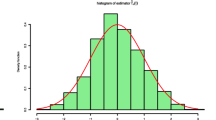Abstract
We consider a (nonlinear) autoregressive model with unknown parameters (vector θ). The aim is to estimate the density of the residuals by a kernel estimator. Since the residuals are not observed, the usual procedure for estimating the density of the residuals is the following: first, compute an estimator \(\hat \theta \) for θ; second, calculate the residuals by use of the estimated model; and third, calculate the kernel density estimator by use of these residuals. We show that the resulting density estimator is strong consistent at the best possible convergence rate. Moreover, we prove asymptotic normality of the estimator.
Similar content being viewed by others
References
Ango Nze, P. and Rios, R.: Estimation de la fonction de densité d'un processus faiblement dépendant: les cas absolument régulier et fortement mélangeant, C.R. Acad. Sci. Paris, Série I 320(1995), 1259–1262.
Bosq, D.: Nonparametric Statistics for Stochastic Processes, Lecture Notes in Statistics, Vol. 110, Springer-Verlag, New York, 1996.
Doukhan, P.: Mixing - Properties and Examples, Springer-Verlag, New York, 1994.
Földes, A. and Revesz, P.: A general method for density estimation, Studia Sc. Math. Hungarica 9(1974), 81–92.
Hall, P. and Heyde, C. C.: Martingale Limit Theory and Its Applications, Academic Press, 1980.
Klimko, L. A. and Nelson, P. I.: On conditional least squares estimation for stochastic processes, Ann. Statist. 6(1978), 629–642.
Kreiß, J.-P.: Estimation of the distribution function of noise in stationary processes, Metrika 38(1991), 285–297.
Liebscher, E.: Kernel estimators for probability densities with discontinuities, Statistics 21(1990), 185–196.
Liebscher, E.: Strong convergence of sums of α-mixing random variables with applications to density estimation, Stoch. Proc. Appl. 65(1996), 69–80.
Liebscher, E.: Asymptotic normality of nonparametric estimators under α-mixing condition, Stat. Probab. Lett. to appear (1998a).
Liebscher, E.: Estimation of the density and the regression function under mixing conditions, Statistics & Decisions, to appear (1998b).
Masry, E. and Tjøstheim, D.: Nonparametric estimation and identification of nonlinear ARCH time series, Econometric Theory 11(1995), 258–289.
Mokkadem, A.: Study of risks of kernel estimators, Teoriya veroyatnostei i eyo primeneniya 35(1990), 531–538.
Parzen, E.: On estimation of a probability density function and mode, Ann. Math. Statist. 33(1962), 1065–1076.
Rio, E.: The functional law of the iterated logarithm for stationary strongly mixing sequences, Ann. Probab. 23(1995), 1188–1203.
Stute, W.: A law of the logarithm for kernel density estimators, Ann. Probab. 10(1982), 414–422.
Tong, H.: Non-linear Time Series: A Dynamical Approach, Oxford University Press, 1990.
Tjøstheim, D.: Estimation in nonlinear time series models, Stoch. Proc. Appl. 21(1986), 251–273.
Rights and permissions
About this article
Cite this article
Liebscher, E. Estimating the Density of the Residuals in Autoregressive Models. Statistical Inference for Stochastic Processes 2, 105–117 (1999). https://doi.org/10.1023/A:1009924821271
Issue Date:
DOI: https://doi.org/10.1023/A:1009924821271



